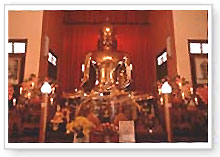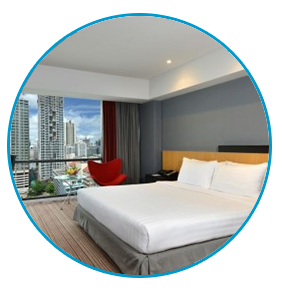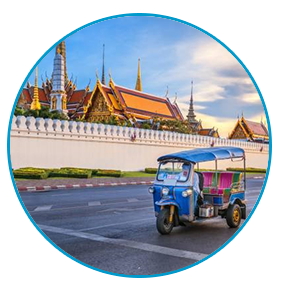ABOUT BANGKOK, THAILAND
source: www.tourismthailand.org
Samphan Thawong
The largest outside of China
Chinatown is a bustling, crowded area where you can buy just about anything day or night.
The main thoroughfare through Chinatown is Yaowarat Road, which is approximately 1.5 kilometres in length. It was built during the reign of King Rama V. On each side of the road, there is a network of streets and alleys lined with shops selling all sorts of things. In many of these streets, you'll find shops side by side selling the same items.
There is an old fresh food market called Trok Isarnuphap where leading chefs from all over Bangkok shop for the finest and freshest ingredients for their restaurant menus.
The largest outside of China
Chinatown is a bustling, crowded area where you can buy just about anything day or night.
The main thoroughfare through Chinatown is Yaowarat Road, which is approximately 1.5 kilometres in length. It was built during the reign of King Rama V. On each side of the road, there is a network of streets and alleys lined with shops selling all sorts of things. In many of these streets youll find shops side by side selling the same items.
There is an old fresh food market called Trok Isarnuphap where leading chefs from all over Bangkok shop for the finest and freshest ingredients for their restaurant menus.
A visit at night will take you to a food street where you sit on stools watching your meal being prepared, then enjoying the delicious cuisine washed down by tea or a cold beer.
How to get there: Subway to Hua Lamphong station
Bus routes 1, 4, 7, 25, 53, 501
![]() Phahurat Indian Market
Phahurat Indian Market
This is the place to come to buy fabrics and to enjoy Indian cuisine. Phahurat Market is a small Indian community on the fringe of Chinatown. Most of the merchants are Indian Sikhs who are involved in the textile trade.
They have a unique way of greeting female shoppers, calling each one Khunying which is a Thai royal title similar to the English Lady. Their selection of fabrics is the best in Bangkok, particularly the Indian cottons and silk.
There are many vendors selling ready made goods including shoulder bags which are at unbelievable low prices.
The Indian community in Thailand shops here for the essential wedding gowns and wedding souvenirs.
In every nook and cranny there is someone doing business. This may be selling trinkets, tour packages to India, household items, spices and delicious Indian desserts.
Wander off the main streets and into the many alleyways, you could come across surprisingly good Indian food.
The Thai Sikh community has a major temple, Siri Guru Singh Sabha close to the Phahurat area.
How to get there: Bus routes 7,25,40, 53, 56, 507
![]() Wat Trai Mit
Wat Trai Mit
Have you ever seen five and a half tons of gold? Wat Trai Mit, near the Bangkok Railway Station at Hua Lamphong, is home to the famous Golden Buddha which is 3 metres high.
 The Golden Buddha is believed to be 700 to 800 years old as it is in the Mara attitude, typical of the Sukhothai era. It was installed at Wat Phrayakrai in the Yannawa area of Bangkok during the reign of King Rama III where it stayed until 1931.
The Golden Buddha is believed to be 700 to 800 years old as it is in the Mara attitude, typical of the Sukhothai era. It was installed at Wat Phrayakrai in the Yannawa area of Bangkok during the reign of King Rama III where it stayed until 1931.
The temple had fallen out of use and was abandoned so the Ecclesiastical Commission had it relocated at Wat Trai Mit. At this time, no one seemed to know that it was made of pure gold.
Then in 1955, Reverend Phra Visutha-thibordee, the presiding abbot at the temple had supervised the construction of the temple building to house the Buddha. When it was being moved into its new position, the covering plaster was damaged revealing what was inside - Buddha image cast in 18 carat gold.
It is believed that the original Golden Buddha was disguised under the plaster covering to hide it from enemies during the Ayutthaya period. Photographs of different stages of the plaster removal are displayed in the Wihan.
How to get there: Metro to Hua Lamphong Station.
Bus routes 4, 7, 21, 25, 501, 511, 513
Open: Daily from 8 a.m. - 5 p.m.
Admission: 20 baht
Tel: 0 2225 9775




